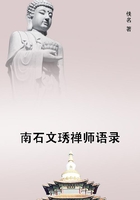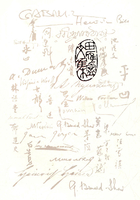"It is not enough, " he said, "to provide separate accommodations for colored citizens even if in all respects as good as those of other persons....The discrimination is an insult and a hindrance, and a bar, which not only destroys comfort and prevents equality, but weakens all other rights.The right to vote will have new security when your equal right in public conveyances, hotels, and common schools, is at last established; but here you must insist for yourselves by speech, petition, and by vote." The Southern whites began to develop the "Jim Crow" theory of "separate but equal"accommodations.Senator Hill of Georgia, for example, thought that hotels might have separate divisions for the two races, and he cited the division in the churches as proof that the Negro wanted separation.
About 1874, it was plain that the last radical Congress was nearly ready to enact social equality legislation.This fact turned many of the Southern Unionist class back to the Democratic party, there to remain for a long time.
In 1875, as a sort of memorial to Sumner, Congress passed the Civil Rights Act, which gave to Negroes equal rights in hotels, places of amusement, on public carriers, and on juries.Some Democratic leaders were willing to see such legislation enacted, because in the first place, it would have little effect except in the Border and Northern States, where it would turn thousands into the Democratic fold, and in the second place, because they were sure that in time the Supreme Court would declare the law unconstitutional.And so it happened.
In regions where the more unprincipled radical leaders were in control, the whites lived at times in fear of Negro uprisings.The Negroes were armed and insolent, and the whites were few and widely scattered.Here and there outbreaks occurred and individual whites and isolated families suffered, but as a rule all such movements were crushed with much heavier loss to the Negroes than to the better organized whites.Nevertheless everlasting apprehension for the safety of women and children kept the white men nervous.
General Garnett Andrews remarked about the situation in Mississippi:
"I have never suffered such an amount of anguish and alarm in all my life.Ihave served through the whole war as a soldier in the army of Northern Virginia, and saw all of it; but I never did experience...the fear and alarm and sense of danger which I felt that time.And this was the universal feeling among the population, among the white people.I think that both sides were alarmed and felt uneasy.It showed itself upon the countenance of the people; it made many of them sick.Men looked haggard and pale, after undergoing this sort of thing for six weeks or a month, and I have felt when Ilaid [sic] down that neither myself, nor my wife and children were in safety.
I expected, and honestly anticipated, and thought it highly probable, that Imight be assassinated and my house set on fire at any time."By the fires of reconstruction the whites were fused into a more homogeneous society, social as well as political.The former slaveholding class continued to be more considerate of the Negro than were the poor whites; but, as misrule went on, all classes tended to unite against the Negro in politics.They were tired of reconstruction, new amendments, force bills, Federal troops-- tired of being ruled as conquered provinces by the incompetent and the dishonest.
Every measure aimed at the South seemed to them to mean that they were considered incorrigible and unworthy of trust, and that they were being made to suffer for the deeds of irresponsible whites.And, to make matters worse, strong opposition to proscriptive measures was called fresh rebellion."When the Jacobins say and do low and bitter things, their charge of want of loyalty in the South because our people grumble back a little seems to me as unreasonable as the complaint of the little boy: 'Mamma, make Bob 'have hisself.He makes mouths at me every time I hit him with my stick.'"** Usually ascribed to General D.H.Hill of North Carolina, and quoted in "The Land We Love", vol.1, p.146.
Probably this burden fell heavier on the young men, who had life before them and who were growing up with diminished opportunities.Sidney Lanier, then an Alabama school teacher, wrote to Bayard Taylor: "Perhaps you know that with us of the young generation in the South, since the war, pretty much the whole of life has been merely not dying." Negro and alien rule was a constant insult to the intelligence of the country.The taxpayers were nonparticipants in the affairs of government.Some people withdrew entirely from public life, went to their farms or plantations, kept away from towns and from speechmaking, waiting for the end to come.There were some who refused for several years to read the newspapers, so unpleasant was the news.The good feeling produced by the magnanimity of Grant at Appomattox was destroyed by the severity of his Southern policy when he became President.There was no gratitude for any so-called leniency of the North, no repentance for the war, no desire for humiliation, for sackcloth and ashes, and no confession of wrong.The insistence of the radicals upon obtaining a confession of depravity only made things much worse.Scarcely a measure of Congress during reconstruction was designed or received in a conciliatory spirit.
The new generation of whites was poor, bitter because of persecution, ill-educated, overworked, without a bright future, and shadowed by the race problem.Though their new political leaders were shrewd, narrow, conservative, honest, and parsimonious, the constant fighting of fire with fire scorched all.In the bitter discipline of reconstruction, the pleasantest side of Southern life came to an end.During the war and the consequent reconstruction there was a marked change in Southern temperament toward the severe.
Hospitality declined; the old Southern life had never been on a business basis, but the new Southern life now adjusted itself to a stricter economy;the old individuality was partially lost; but class distinctions were less obvious in a more homogeneous society.The material evils of reconstruction may be only temporary; state debts may be paid and wasted resources renewed;but the moral and intellectual results of the revolution will be the more permanent.















